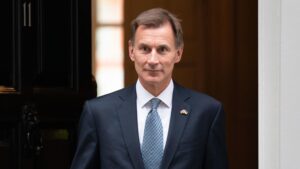Government departments are due to spend £24 billion less than the Treasury budgeted for last October, new figures show, increasing pressure on Jeremy Hunt before next month’s budget.
A breakdown of Whitehall spending, presented to MPs, shows big reductions in the budgets of the business and energy department, as well as Michael Gove’s levelling up department.
Total government spending this financial year is expected to be just over £764 billion, compared with the £789 billion budgeted in the autumn.
However it is still significantly higher than the £117 billion projected last June, before the unprecedented increase in energy prices and Liz Truss’ mini-budget.
The Treasury said that the better-than-expected figures did not mean that the chancellor had more room for tax cuts, pointing out that the savings were a one-off. It added that Hunt’s overwhelming priority was still tackling inflation that would be stoked by any kind of fiscal loosening, including tax cuts.
The figures suggest, though, that the chancellor has greater flexibility than at the end of last year to fund one-off costs such as freezing petrol duty for a further year or making cost of living payments to striking public sector workers in an attempt to bring industrial disputes to an end.
It could also allow Hunt to temporarily freeze the current £2,500 energy price guarantee, which is due to rise to £3,000 in April — increasing consumer bills as wholesale energy prices are falling.
Among the departments to report the biggest falls in their expected spend is the department of business, energy and industrial strategy, which will have a £3.7 billion saving due to the lower cost of the energy price guarantee. It will also save £1.6 billion this year in its science and technology budget, earmarked for British participation in the EU’s Horizon scheme.
Michael Gove’s levelling up department appears to have a £2.4 billion reduction in its capital budget, due in part to spending less than budgeted on the affordable homes scheme.
Treasury sources said that some of the underspend — including the Horizon money — did not represent real savings as the money would be spent in subsequent financial years.
“Budget revisions are a normal part of government finance, enabling departments to work flexibly and deliver programmes to a high standard,” a Treasury spokesman said.
“Cash changes this year are mainly driven by falling wholesale energy prices. While this is good news, fiscal headroom remains historically low and wholesale energy prices remain volatile — meaning they can increase as fast as they fall.”
The sources added: “If prices return to their late August level, the government would need to borrow an extra £42 billion and potentially increase taxes to continue funding the energy price guarantee at current levels.”
The figures come amid increased pressure on Hunt to review his plans to raise corporation tax from 19 per cent to 25 per cent.
Lord Hammond of Runnymede, who was Theresa May’s chancellor, has become the latest former chancellor to warn against the proposal, saying that he was “disappointed” with the rise.
Kwasi Kwarteng, the chancellor under Liz Truss, has said that the policy would not help the UK to become more competitive, while George Osborne has said that Hunt should cut business taxes at next month’s budget to boost the economy.
“My view on corporation tax is always that it’s better to have lower than higher. I am quite disappointed that we will be increasing it to 25 per cent,” Hammond told the Sunday Telegraph.
“Businesses would accept 25 per cent corporation tax if they felt they had all the other bits in place for a growing economy. But the labour market is not working, the planning system is not working and none of the preferential trade deals with big powers around the world have come to pass.”
The Federation of Small Businesses said that the policy would be disastrous for the UK’s one million limited company directors.
“If they earn more than £50,000, they will get hit and that hurts a lot of people. People think corporation tax is only an issue for big businesses — but when we speak to our members and ask what they need help with, corporation tax is top of the list,” Craig Beaumont, the federation’s spokesman, said.
“If you want the economy to bounce back, one way of not doing that is making it harder for small business owners.”
Read more:
Jeremy Hunt handed £24bn spending boost before budget


























